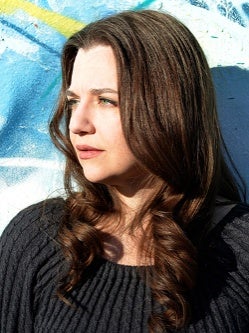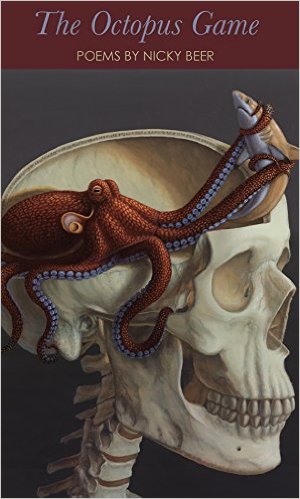 When Nicky Beer, a poet, professor and self-proclaimed animal lover, walked into the Tennessee Aquarium she expected to be inspired by the colorful seahorses and weedy sea dragons that were on special exhibit. Instead, during that visit several years ago, a mysterious and charming creature with eight tentacles and bulbous eyes captured her imagination.
When Nicky Beer, a poet, professor and self-proclaimed animal lover, walked into the Tennessee Aquarium she expected to be inspired by the colorful seahorses and weedy sea dragons that were on special exhibit. Instead, during that visit several years ago, a mysterious and charming creature with eight tentacles and bulbous eyes captured her imagination.
"I got sucked in – pun intended – by this really charismatic octopus," said Beer, Associate Professor of Creative Writing in the Department of English. "I couldn't stop thinking about this octopus, so I wrote one poem, then I wrote another and another."
Ultimately, she wrote a book's worth of poems that revolve around octopi and other phenomena of nature. The Octopus Game (Carnegie Mellon University Press), recently won the Colorado Book Award for Poetry. Beer won the same prestigious award for her first book, The Diminishing House (Carnegie Mellon, 2010).
In delving deeper into octopi, Beer discovered boundless inspiration. "Partially, it comes out of how octopi are built," she said. "They are malleable and have this capacity for camouflage. They're a metaphor machine – an animal that can become so many things."
Beer's affinity for animals is reflective of her deep love and respect for science in general. She frequently references science and even notable scientists in her work. For example, the stanza Today my total gravity will be monstrous in "Black Hole Itinerary," a poem in her new book, borrows from astrophysicist Neil deGrasse Tyson.
Science and poetry have much in common, Beer said, adding that she enjoys having students who are majoring in the hard sciences in her poetry classes. She tells them that poets and scientists share a similar mindset: a desire to discover truths and a willingness to let research take you to unexpected and often exciting places.
"The ingenuity, creativity and imagination of the sciences are incredible," Beer said. "People don't always think of poetry as something that gets researched. For me, it's an essential part of the creative process. When I walk into a zoo or museum, that's an essential part of the creative process."
Also exhilarating for Beer is serving as poetry co-editor of Copper Nickel, the national literary journal housed at CU Denver. The journal provides students the rare opportunity to "see from the ground up how literature comes into the world," she said. "It's also fantastic for students to see what's being written about now – in the moment in which they're living."
She's grateful that CU Denver continues to value Copper Nickel at a time when some universities are backing away from publications of similar stature due to budget constraints. "The short-term savings of discontinuing a journal or press doesn't outweigh the devastating long-term costs of losing an important mode of literary representation in the world."
Beer's husband, Brian Barker (Assistant Professor of Creative Writing in the Department of English), is also a co-editor of poetry for Copper Nickel. Beer said they both appreciate the supportiveness of fellow writing professors as well as colleagues representing other specialties in the department. "It's been years since I was hired and I'm still astonished by the richness and extraordinary strength of the Department of English," Beer said. "I'm incredibly proud of the department."
When Beer had written a handful of poems about octopi, it was a dose of encouragement from a St. Louis-based poet, Carl Phillips, a professor at Washington University, that pushed her deeper into the murky world of the sea creature. He told her: why stop at eight poems?
Phillips' suggestion opened up her imagination and basically launched the book, Beer said. "I think that's what a good teacher can be: Someone who says to a student, ‘This is really great; don't limit yourself. How far can you take this idea? How far can you play with it? What are all the possibilities?'"
Beer also recently had a poem published in The New Yorker magazine.
 The cover art for The Octopus Game was created by CU Denver alumna Sandra Yagi. Before she pursued a successful career in visual arts, Yagi earned her BS and MBA at the CU Denver Business School. Nicky Beer found Yagi by pure coincidence, as she looked online for artists whose work features animals and the natural sciences. Yagi has received international acclaim for her distinctive oil paintings that often pair birds and reptiles with cut-away human skulls. "Basically, (Yagi) made me part of the process as she did the work," Beer said. "It was really amazing to be part of that process. She's an amazing artist."
The cover art for The Octopus Game was created by CU Denver alumna Sandra Yagi. Before she pursued a successful career in visual arts, Yagi earned her BS and MBA at the CU Denver Business School. Nicky Beer found Yagi by pure coincidence, as she looked online for artists whose work features animals and the natural sciences. Yagi has received international acclaim for her distinctive oil paintings that often pair birds and reptiles with cut-away human skulls. "Basically, (Yagi) made me part of the process as she did the work," Beer said. "It was really amazing to be part of that process. She's an amazing artist."
She is already at work on her third book of poems, which expands on some of the ideas and themes explored in The Octopus Game. The working title is Real Phonies and Genuine Fakes. "It will be a lot of poems about fakery, trickery, subterfuge and hiding," Beer said with a chuckle.
Originally published by Chris Casey, content manager for University Communications, July 5, 2016.
